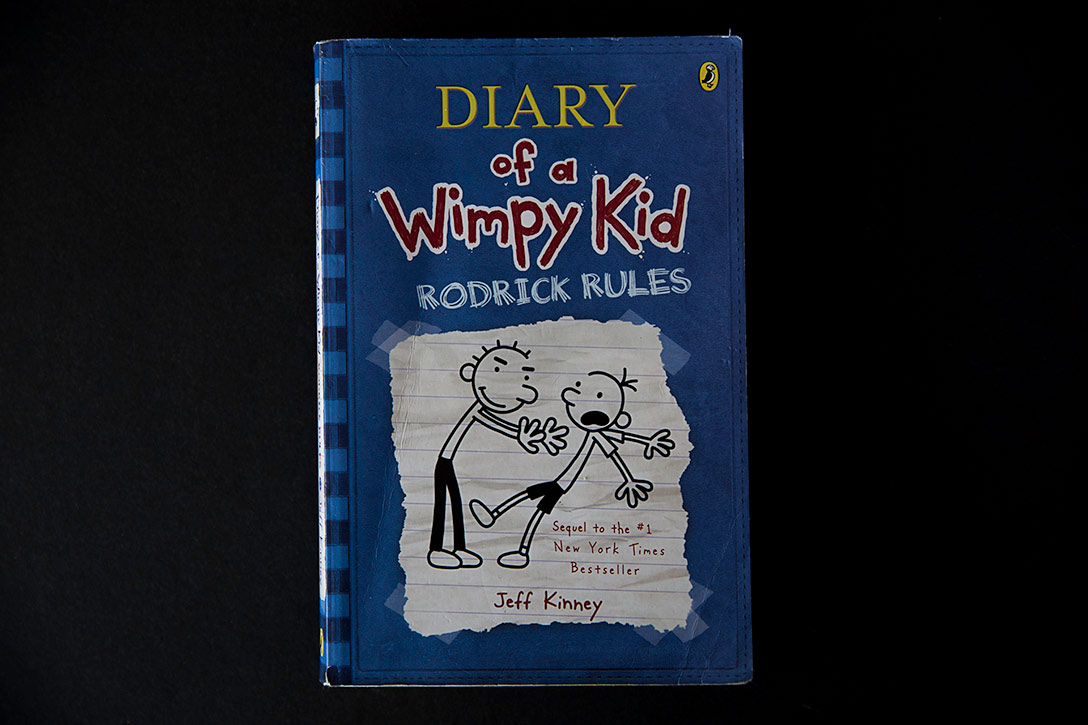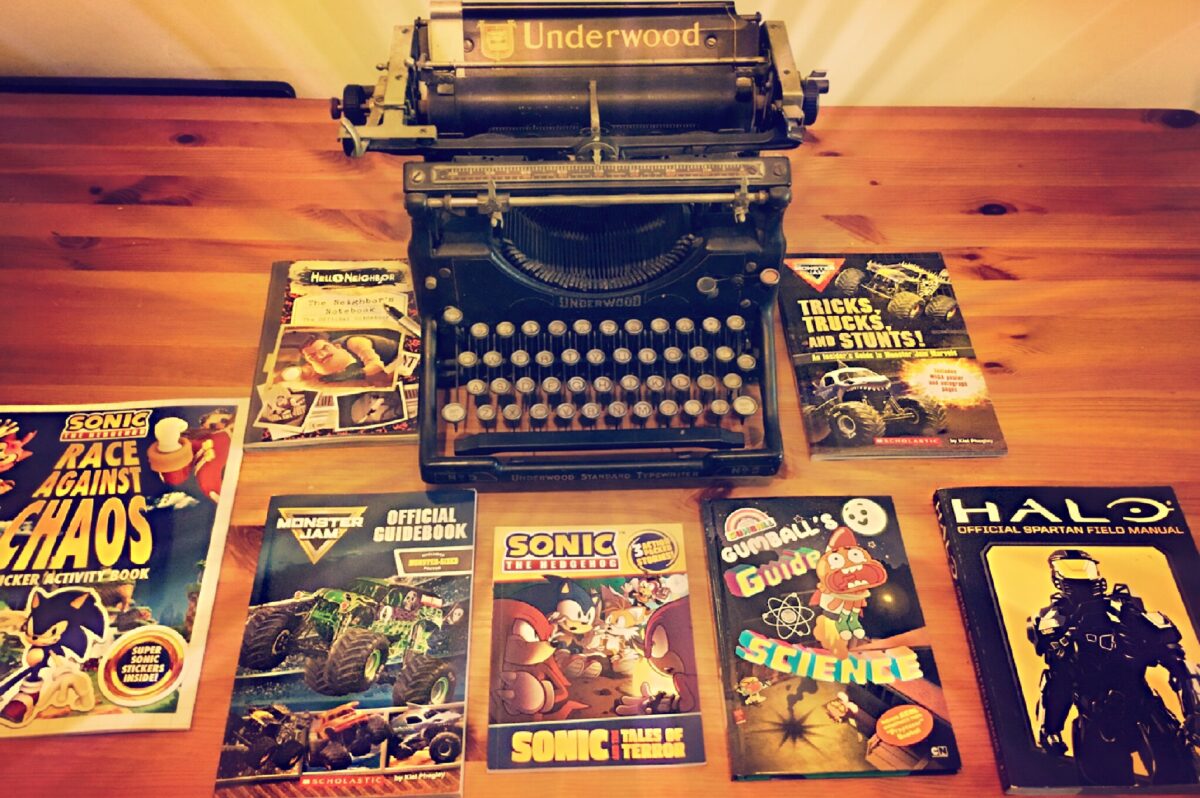[NOTE from the future that is 2019: This is one of a number of posts I’ve migrated over to the site from my internet past that’s been scrubbed in one way or another. This particular post is the first time I interviewed Diary of a Wimpy Kid author Jeff Kinney, shortly after the release of the second book in the now-ubiquitous series, and it ran on the lost website of Wizard Magazine where I worked my first job.]

Comic fans and industry pundits can quibble over what makes the best comics for any number of intended audiences, but when it comes to Jeff Kinney’s Diary of A Wimpy Kid, the intended audience of children agree on how they feel about the book.
They like it.
A LOT.
The comic/chapter book hybrid focusing on the adventures of a self-centered sixth-grader named Greg Heffley’s adventures with video game addiction, moldy cheese and playground bullies hasn’t just garnered critical acclaim, it’s a proven sales hit as well. In fact, the first volume hit #1 on The New York Times’ Children’s Best Sellers list, and since its release in the middle of January Rodrick Rules (the second Wimpy book) has already started to skyrocket up the sales charts to the top ten of USA Today’s January sales estimates for all books.
And while the Wimpy Kid series may be racked as a children’s book, Kinney’s comics cred is well intact, especially considering he started the series as a webcomic. Diary of A Wimpy Kid was first serialized online at the kids website Funbrain where the initial chapters can still be read for free. With Rodrick Rule on sale now, Kinney took the time to tell Wizard Universe about his history as a cartoonist, his initial trepidation about publishing on the web and his five book plan for Greg Heffley and friends.
Kiel Phegley: My first question for you is what do you consider yourself? So many in the comics camp hold Wimpy Kid up as a graphic novel, but it’s sold primarily in the children’s book section. Do you consider yourself a children’s author or a cartoonist?
Jeff Kinney: I put myself firmly in the cartoonist camp. I’ll actually call myself a “Failed Cartoonist.” [Laughs] What I wanted to do—years ago I set out to become a newspaper cartoonist, and I had a successful comic in my college newspaper called Igdoof. I thought I was on my way to the big time, but I absolutely wasn’t. I got rejected for about three years or so, and then I decided that I was going to get into cartooning through the back door. And so it took me about ten years to get here from there, but it’s worked out because I feel like Greg Heffley is as legitimate of a cartoon character as he would be on the newspaper page.
You started out online before being picked up by Abrams, correct?
Actually, I started running it in May of 2004 online, and I felt fairly conflicted about doing that for two reasons. One was that I had always intended this to be a book for adults—a sort of nostalgic look back at childhood in the ‘70s or ‘80s. So putting it on a kid’s site was a jump for me. Another reason was that it would make it harder for me to get picked up by a legitimate publisher because I thought it would cheapen it to say, “Well, I have a web comic, and I’d like to make it into a book,” when it was always intended to be a book. But the pull was irresistible. Fun Brain, where I work, has millions of kids coming in every day. It was a good chance for me to roll the book out as I wrote it.
Well, if you wrote as you went, I’m assuming that you didn’t have every bit of every chapter planned out from day one. Did you get feedback from readers as you wrote and adapt to their suggestions?
Actually, I did have this conceived as one giant 13,000-page narrative. So I wasn’t writing it as I went in that sense. I wasn’t writing it like a blog writer might write. I had a well thought out narrative that I laid out over the course of the year. Feedback was really great. Getting feedback from kids is what helped me to find what works and what doesn’t. So that helps me to put just the very best stuff into the print books.
Did you redraw things to get ready for the print book at all?
Yes. I actually redrew everything in the book because I wanted a consistency in the characters. No matter what you do, your characters change over time no matter how consistent you try to stay. And I think that takes away from your belief in the character. So what I wanted to do was make sure that the characters looked absolutely consistent across the life of the whole series, and so I redrew everything and abandoned pencil and paper and went fully digital.
Tell me a little about how you made it from online to print. I know your editor at Abrams is Charlie Kotchman who is a big comics guy. Did he find your comic online and ask you to submit, or did you pitch to Abrams first?
I completely lucked out. I went down to New York Comic-Con with my fulltime job hat on. I was looking for cartoonists for our website, and I wasn’t intending to pitch my book. But I thought that in case I ran into the perfect person, I wanted to have something in my hand, so I put together like a 20-page sample.
Then at Comic-Con, I felt like it wasn’t the right place to shop the book. So I didn’t, but I ran into somebody that told me about Mom’s Cancer which was a web comic that Abrams turned into a real book. Then literally on my way out the door, I saw the Abrams booth with Mom’s Cancer. I just stopped for a second, and Charlie engaged me in conversation, and I told him what I was up to. And I braved pulling my little manuscript sample out of my laptop bag and handed to him. He, I think within a minute, looked at it and responded to it visually and said, “This is exactly what we’re looking for. This is why we came here.” I think that was their first Comic-Con too, so it was a very fortuitous meeting. It really worked out. I didn’t know anything of Charlie and had no idea of his stature in the comics world, so it really felt like providence to me.
Let’s talk about Greg and you. Were you a wimpy kid, and did you have a diary?
Yes. I had my moments of being a wimpy kid. I think I was a pretty average kid, but my wimpy moments were pretty far off the charts. I did not have a diary, but if I did, one of the stories I might have recorded or might have omitted on purpose was that in swim team when I was a kid I used to hide out in the locker room and for the whole practice I would hide out in the stalls and literally wrap myself in toilet paper to prevent myself from getting hypothermia. That’s kind of where Greg Heffley was born, I think, from those moments that I’m not so proud of.
As you’ve gotten to know Greg over the course of the first two volumes of this planned series, what have you learned about him? Are there things you respect about him despite his attitude?
In as far as Greg being a reflection of me, I think I’ve been more disturbed than anything. Greg kind of holds up a mirror to myself, but he is a bit narcissistic. He always does the right thing as long as it’s the right thing for him. And so I think maybe he’s reflective of the average kids mindset, but it makes you wonder about yourself a little bit and think about how you behave as an adult.
With so many of these all ages comics there are different aspects that are mostly for adults. Since you started this as a project with adults in mind, what to you appeals to older readers the most or in a different way?
I think that a lot of adults who read the book respond to it and say that they had forgotten what Middle School was like and this reminds them. I love hearing that because it means that I’m being successful in what was my original intent, which was to write the book for adults.
It’s so weird that kids books and graphic novels ride this readership line. Your book specifically fits that because it has a very sympathetic idea that anyone can pick up, and it’s in kids books, and comic people are noticing it. You’re at the eye of this little publishing hurricane.
Yeah. I think that also, kids are much more sophisticated than we give them credit for. They can take a book like The Arrival and understand it, even though The Arrival clearly isn’t a kids book. But a kid could appreciate it and meet the author at the level at which it was written.
With two books out in this format, which are kind of like chapter books where each chapter is its own story but they build a larger narrative, do you find that you’re injecting more plot as the books go and building that larder story up?
Books one through three of what will become a five book series are intended to be a stand-alone trilogy, and it’s really the father’s story. You wouldn’t necessarily notice it as you were reading until you saw the whole thing from afar. But in book one, Greg’s father is passive about Greg. He’s passively disapproving. In book two, an event takes place to make Greg’s father realize that he has to change Greg. And in book three, Greg’s father actively tries to change Greg. So there is a narrative there, but the narrative isn’t really my focus. On every page I’m just trying to get a laugh, and I feel that it’s hard for me to trade in plot for laughs.
The subtitle for book two is “Rodrick Rules,” and Greg’s brother Rodrick plays a heavy role. Is that sibling rivalry the catalyst for the change in their father?
Yes, it is. Rodrick does something to betray his father’s trust, which causes the father ironically to turn a more cautious eye on Greg.
Do you have siblings as well, and does your family history play a role in the creation of the books?
Greg’s Heffley’s family is similar to mine, but the family also is every family.
You’ve got a five book series planned, which is a huge undertaking that I’m sure you’re nowhere near finished yet. But since the style of this series is meant to look like a kid’s diary in terms of the cartooning, looking forward are there other kinds of comics you’d want to explore?
None that I’ve thought of yet, however I feel that Greg Heffley’s more of a cartoon character than a literary character. And I don’t see a reason to terminate him after five books. I’d love for him to live on forever in one capacity or another until my ideas run dry. So for now, I’m going to stick with him.
_________________________________________
For more info on the Diary of A Wimpy Kid comics and author Jeff Kinney, check out Funbrain as well as the book’s official website.
